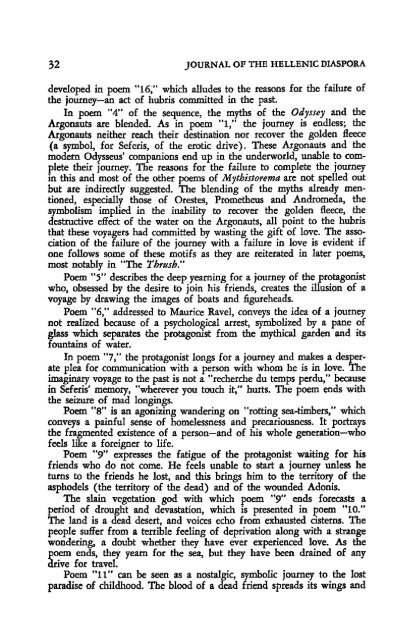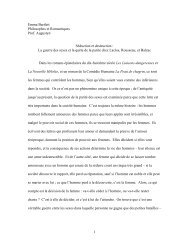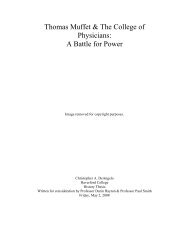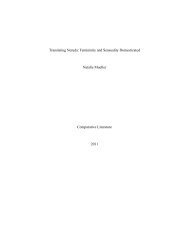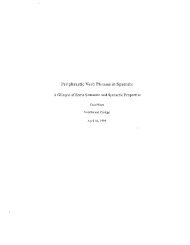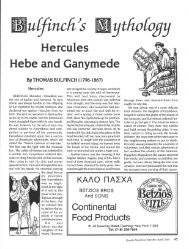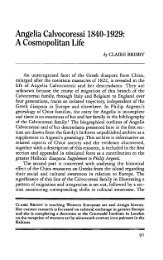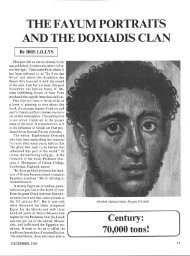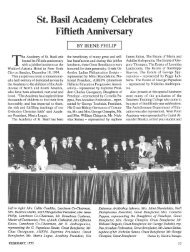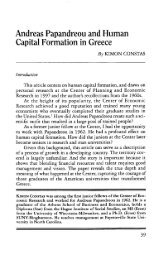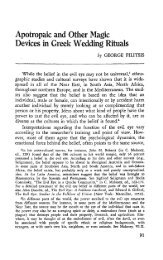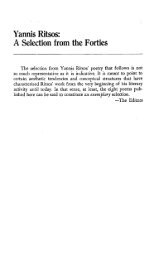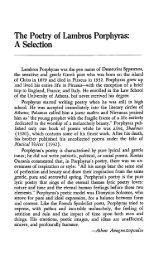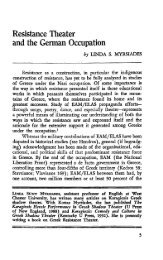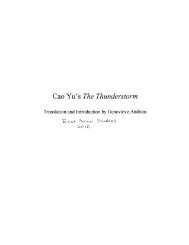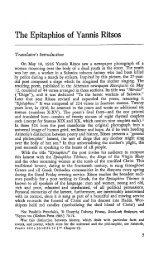Mythistorema - Triceratops Home
Mythistorema - Triceratops Home
Mythistorema - Triceratops Home
Create successful ePaper yourself
Turn your PDF publications into a flip-book with our unique Google optimized e-Paper software.
32 JOURNAL OF THE HELLENIC DIASPORA<br />
developed in poem "16," which alludes to the reasons for the failure of<br />
the journey—an act of hubris committed in the past.<br />
In poem "4" of the sequence, the myths of the Odyssey and the<br />
Argonauts are blended. As in poem "1," the journey is endless; the<br />
Argonauts neither reach their destination nor recover the golden fleece<br />
(a symbol, for Seferis, of the erotic drive). These Argonauts and the<br />
modem Odysseus' companions end up in the underworld, unable to complete<br />
their journey. The reasons for the failure to complete the journey<br />
in this and most of the other poems of <strong>Mythistorema</strong> are not spelled out<br />
but are indirectly suggested. The blending of the myths already mentioned,<br />
especially those of Orestes, Prometheus and Andromeda, the<br />
symbolism implied in the inability to recover the golden fleece, the<br />
destructive effect of the water on the Argonauts, all point to the hubris<br />
that these voyagers had committed by wasting the gift of love. The association<br />
of the failure of the journey with a failure in love is evident if<br />
one follows some of these motifs as they are reiterated in later poems,<br />
most notably in "The Thrush."<br />
Poem "5" describes the deep yearning for a journey of the protagonist<br />
who, obsessed by the desire to join his friends, creates the illusion of a<br />
voyage by drawing the images of boats and figureheads.<br />
Poem "6," addressed to Maurice Ravel, conveys the idea of a journey<br />
not realized because of a psychological arrest, symbolized by a pane of<br />
glass which separates the protagonist from the mythical garden and its<br />
fountains of water.<br />
In poem "7," the protagonist longs for a journey and makes a desperate<br />
plea for communication with a person with whom he is in love. The<br />
imaginary voyage to the past is not a "recherche du temps perdu," because<br />
in Seferis' memory, "wherever you touch it," hurts. The poem ends with<br />
the seizure of mad longings.<br />
Poem "8" is an agonizing wandering on "rotting sea-timbers," which<br />
conveys a painful sense of homelessness and precariousness. It portrays<br />
the fragmented existence of a person—and of his whole generation—who<br />
feels like a foreigner to life.<br />
Poem "9" expresses the fatigue of the protagonist waiting for his<br />
friends who do not come. He feels unable to start a journey unless he<br />
turns to the friends he lost, and this brings him to the territory of the<br />
asphodels (the territory of the dead) and of the wounded Adonis.<br />
The slain vegetation god with which poem "9" ends forecasts a<br />
period of drought and devastation, which is presented in poem "10."<br />
The land is a dead desert, and voices echo from exhausted cisterns. The<br />
people suffer from a terrible feeling of deprivation along with a strange<br />
wondering, a doubt whether they have ever experienced love. As the<br />
poem ends, they yearn for the sea, but they have been drained of any<br />
drive for travel.<br />
Poem "11" can be seen as a nostalgic, symbolic journey to the lost<br />
paradise of childhood. The blood of a dead friend spreads its wings and


